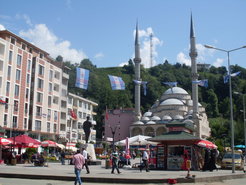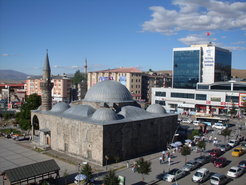State of Emergency in Turkey (and a way forward)
Author: Chris Hann
July 21, 2016
It is a cliché of the tourist brochures as well as academic social science to state that Turkey straddles East and West, or that the nation-state successor to the Ottoman Empire constitutes a unique bridge between Asia and Europe. The link is not merely geographical. An overwhelmingly Muslim population has lived for almost a century in a secular republic designed according to the precepts of the Western Enlightenment. But the viability of this hybrid has been repeatedly questioned and today this country of 75 million citizens is facing a very serious challenge.
Ildikó Bellér-Hann and I analysed these tensions and contradictions during our field research on the east Black Sea coast in the 1980s and 1990s. The district governor (kaymakam) in a small town once remarked to us that the ship of state established by Atatürk (Mustafa Kemal) was sailing steadily and surely westwards – but then added wryly that we must understand that most of the passengers on this ship were still determined to face east (Bellér-Hann and Hann 2000: 187).
Turkey joined NATO in 1952. The economy had a strong state sector but was fundamentally capitalist and integrated into western markets. Turks from the Black Sea region were prominent in the first cohorts of Gastarbeiter in Germany. Ankara applied formally for membership of the European Economic Community as early as 1987 (having been an associate since 1963).
Following a third military coup in 1980, multi-party democracy was restored in 1983. Successive governments strengthened the role of the market, in keeping with the neoliberal trends of the age. But the country remained politically and economically fragile to the end of the century. As a supplicant for membership of the organization which by now was called the European Union, following the end of the Cold War this Muslim state was quickly supplanted by the Christian states of Eastern Europe.
By the time the EU admitted the postsocialist states of the former Soviet bloc in 2004-2007, the situation in Turkey had changed radically. Under its charismatic leader Recep Tayyip Erdoğan, the Justice and Development Party (AKP) won a remarkable electoral victory in 2002. The old parliamentary elites were largely displaced. For the first time, an Islamist party succeeded in repelling the military and consolidating its rule. The governments led by Erdoğan continued the market-oriented reform programmes and enjoyed great success over the ensuing decade. In addition to creating a favourable business climate for “Islamic Calvinists” in the cities and smaller towns of Anatolia, AKP provided its supporters with a more meaningful socio-cultural vision of their country than the previous militant secularism.i But Erdoğan did not abandon Kemalism and he did not cease to look westwards, to Europe. The abolition of the death penalty in 2004 and conciliatory policies towards the Kurdish minority were the most significant expressions of the determination of Turkey’s new power holders to show that their values were compatible with those of Europe.


What was the response in the West? A successful economy and a stronger government in Ankara did not lead the EU to look more favourably on the longstanding Turkish application. On the contrary, through a combination of incompetence, neglect and sheer prejudice, especially during the presidency of José Manuel Barroso, the Turkish authorities received the clear message that they were still unwelcome in the Christian club. The message was reinforced at the highest level by the leaders of the principal power-axis of the EU, Germany and France. The resulting frustration in Turkey was profound and the consequences are now evident for all to see. In recent years, in the context of disintegration in Iraq and Syria, the Kurdish conflict has again descended into brutal violence. After nearly 15 years in power, President Erdoğan has been practically invited and incited to indulge his megalomaniacal fantasies.
The attempted coup of 15 July 2016 is the culmination of these sad trends, for which the EU must bear a large share of responsibility. In the previous century, repeated successful interventions by the military were an argument for scoffing at the possibility of Turkey’s joining Europe. Now that a military intervention has failed, thwarted (so it seems) by the bravery of ordinary citizens ready to defy the tanks on the streets, you might think that Turkey had proven its commitment to electoral democracy once and for all. But all the attention in the West focuses on the reprisals; the country is said to be in the hands of fascists and fundamentalists, and further away than ever from meeting European standards and European values.
This week’s developments in Turkey (including the proclamation of a state of emergency, draconian interventions in academic freedom, and talk of re-introducing the death penalty) are as abhorrent to me as to other foreign observers. But in the light of the solid support that AKP continues to enjoy in the population (a popular legitimation far greater than that of most other European governments), and in view of the shoddy treatment meted out to Turkey over decades, my policy prescription is the opposite of that which seems to dominate in the German and English media. It does no good at all if the Western Europeans who have hitherto treated Turkey so hypocritically now ostracise Erdoğan and condemn his current posturing and purges from a position of moral outrage. At a time when states of emergency are not unusual in the West, and when plenty of academics and judges are losing their jobs in the “illiberal democracies” of certain EU member states, no one in Brussels or Berlin can claim the moral high ground. It is in any case rich to talk of sanctioning Ankara by putting accession procedures “on ice” when that ice has barely cracked since 1963.
I argue instead that this is the moment for the EU to seize the initiative and accelerate accession talks (formally launched in 2005). Jean-Claude Juncker should fly promptly to Ankara, accompanied by Angela Merkel. They should negotiate imaginatively to correct the careless loss of 60 million Brits by the careful gain of 75 million Turks.
There are precedents for such creative diplomacy. Little more than a generation ago, Greece became the first member-state with a predominantly eastern Christian population. Its accession was rushed forward for political reasons, following a military junta in Athens and a precarious return to democracy in 1974. The accession of the first predominantly Muslim member would be a comparable safeguard for the future. It would recognize the intimate links that have drawn the populations of western Eurasia together during millennia. Turkey has long been considered eligible to join the West militarily, and eligible to export its labour power to the West. It is time to seal a political pact and to promote socio-cultural integration in place of Islamophobia across the entire European macro-region. Quite apart from the fact that Ankara’s short-term cooperation remains crucial in dealing with the “migrant crisis”, this would be in the long-term interests of all Europeans.
References
Bellér-Hann, Ildikó and Chris Hann 2000 Turkish Region: State, Market and Social Identities on the East Black Sea Coast. Oxford: James Currey.
Öktem, Kerem 2011 Angry Nation. Turkey since 1989. London: Zed Books.
Note
i The “Islamic Calvinists” and “Anatolian tigers” are a focus of the project of Ceren Deniz within the REALEURASIA team. For background, see Öktem 2011.

